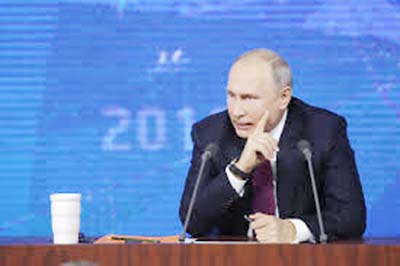
Reuters, Moscow :
Russian President Vladimir Putin said on Thursday that the threat of nuclear war should not be underestimated, but that he hoped that common sense would prevail.
Speaking at his annual news conference, Putin said it was hard to predict what the consequences would be of a U.S. withdrawal from the landmark Intermediate-range Nuclear Forces Treaty, signed in 1987.
President Vladimir Putin on Thursday said he would take Russia into “a new economic league,” during an annual press conference that follows months of growing discontent at home.
International tensions, from an ongoing stand-off with Ukraine to increasingly frosty relations with Washington, also loomed large at the event.
Economic questions dominated the opening exchanges, with Putin beginning as usual by reeling off growth figures.
“The main thing is that we need to get into a new economic league. We could very well take the fifth place in terms of size of economy. And I think we’ll do that,” Putin said from behind a large wooden desk to an audience of hundreds of journalists. Russia is currently ranked 12th in the world pecking order by the International Monetary Fund, with economic output worth some $1.5 trillion. The IMF list is led by the United States followed by China, Japan, Germany and with Britain in fifth place.
Putin said the economy grew 1.7 percent over the first 10 months of the year, roughly in line with predictions, while unemployment was down. Full-year growth is estimated at 1.8 percent. “After a long break, a small growth in real incomes has none the less been recorded,” he added.
The press conference comes with the longtime leader’s approval rating sliding, the first notable decline in his popularity since 2014, following an unpopular pension reform.
Putin was re-elected to a fourth term in March with nearly 77 percent of the vote, but recent polls have seen his support falling to below 50 percent.
His previous term in the Kremlin was defined by a decline in living standards for many Russians, despite what were perceived as foreign policy wins.
Moving onto foreign policy questions, Putin warned of a “collapse of the international arms (control) system” after Washington announced it would withdraw from a key Cold War treaty.
Putin earlier said Moscow would develop new missiles in response to US President Donald Trump’s dramatic decision to drop the Intermediate-Range Nuclear Forces treaty. He also addressed the recent escalation of tensions with Ukraine following a naval confrontation in the Kerch Strait and Russia’s arrest of several Ukrainian sailors. Putin repeated Kremlin claims that Ukrainian actions in the strait were a “provocation”.
The most important domestic issues likely to come up at the event are this year’s controversial hike in the retirement age and planned increases in value-added tax and household utilities fees.
The Kremlin demands questions be sent in advance, but reporters every year go to great lengths to encourage the president to call on them.
This year one journalist was dressed as a Russian fairytale character, the snow maiden, while another came holding a tambourine.
Organisers, however, put a size limit on the placards media representatives traditionally hold up to attract Putin’s attention.
The president began the tradition of such end-of-year press events in 2001, but with time they have evolved into marathon events. Since 2004, all December press conferences have surpassed three hours.
His record was in 2008, when questions and answers went on for four hours and 40 minutes.
The appearance was shown live on several TV stations, with some channels trailing the event with a day-long countdown clock.
As Russia has become increasingly centralised under Putin, questions at the conference have begun to resemble lobbying attempts to resolve specific problems, from fixing roads to freeing political prisoners.
One reporter memorably asked Putin in 2014 to help a local drink brand access supermarket chains.

